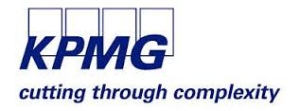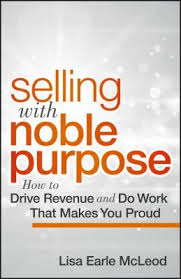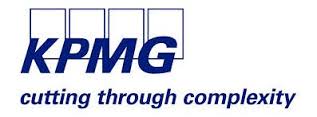
Do you consider your work a calling? Or is it just a job?
The recent Wall Street Journal article, “I Don’t Have a Job. I Have a Higher Calling,” evoked a firestorm on line from people who felt that trying to bring higher purpose into the workplace was like “putting lipstick on a pig.”
The piece, describing how organizations like Harley Davidson and KPMG are trying to “inject meaning into the daily grind,” drew hundreds of comments from cynics doubting the effectiveness and sincerity of the effort.
One commenter called the purpose movement “another manipulative and politically-correct management gimmick, replete with pious posing and sloganeering, like all the rest of the kitschy management gewgaws that wash over us in waves.”
I bet he’s fun to work with. Yet I understand his cynicism. Who hasn’t seen flavor of the month programs that are nothing more than words?
When I wrote Selling with Noble Purpose three years ago a lot of people who didn’t believe it was possible, discounted it. The frustrated comments on the Wall Street Journal site likely reflect one of two realities I’ve observed in our consulting practice:
people who didn’t believe it was possible, discounted it. The frustrated comments on the Wall Street Journal site likely reflect one of two realities I’ve observed in our consulting practice:
1. People have never experienced working for someone who is actually purpose-driven.
2. Or, they don’t believe that their leaders actually care about a higher purpose.
Studies show that only a third of people consider their work a higher calling, the other two thirds view it as just a paycheck. That’s a shame. Because the data is clear Noble Purpose is directly linked to both profitability and personal happiness.
Our research revealed:
• Salespeople who sell with Noble Purpose, who earnestly and factually want to improve the lives of their customers, outsell salespeople who focus on targets and quotas.
• Organizations with a Noble Sales Purpose (NSP) outperform the market by over 350%.
• Individuals who experience purpose and meaning in their work are happier and they outperform employees for whom it’s just a job.
When I speak and consult with companies like Google, Hootsuite, and Roche, they tell me that Noble Purpose has increased sales, and created more engaged employees. When senior leaders are authentic in their desire to improve customers’ lives, it has a dramatic impact on morale and results.
The WSJ article cites an internal KPMG survey, which found that “employees whose managers talked about KPMG’s impact on  society were 42.4% more likely to describe the firm as a great place to work. Of those with managers who talked up meaning, 68% indicated they rarely think about looking for a new job outside KPMG; that share fell to 38% for employees whose managers didn’t discuss meaning.”
society were 42.4% more likely to describe the firm as a great place to work. Of those with managers who talked up meaning, 68% indicated they rarely think about looking for a new job outside KPMG; that share fell to 38% for employees whose managers didn’t discuss meaning.”
Beyond food and shelter, human beings have two fundamental needs: connection and meaning. We want to belong and we want to feel significant. There’s an odd paradox at play in the workplace, as much as people want to be part of something bigger than themselves, they’re often uncomfortable when leaders try to apply such lofty concepts to tasks like accounting or customer service. Yet in my experience, organizations and individuals who bring more meaning to their work, enjoy themselves more than those who are simply checking the boxes.
People want to make money. They also want to make a difference. Bringing Noble Purpose into your work enables you to do both.